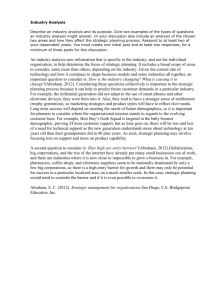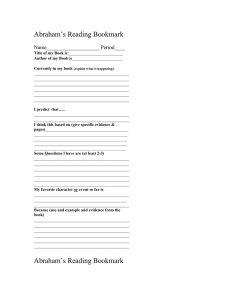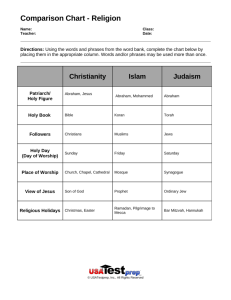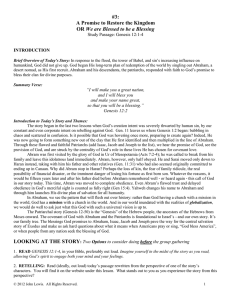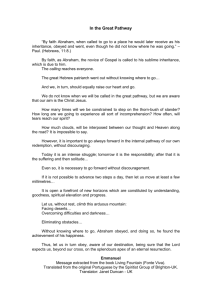Abraham: the man who was promised the world Session 2
advertisement
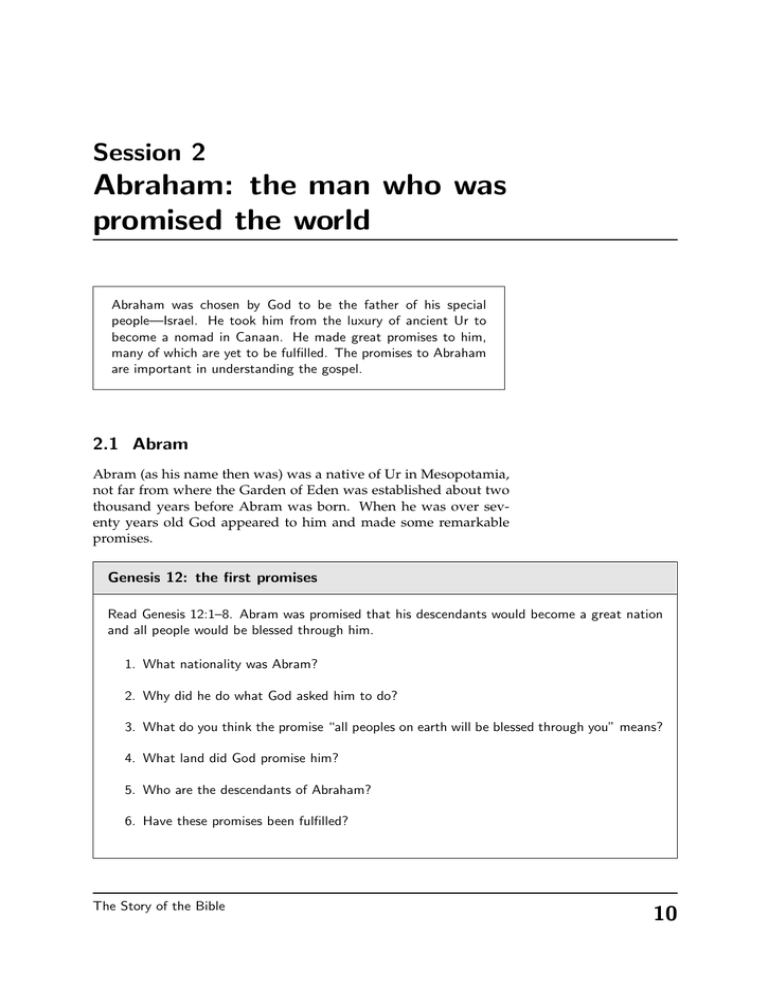
Session 2 Abraham: the man who was promised the world Abraham was chosen by God to be the father of his special people—Israel. He took him from the luxury of ancient Ur to become a nomad in Canaan. He made great promises to him, many of which are yet to be fulfilled. The promises to Abraham are important in understanding the gospel. 2.1 Abram Abram (as his name then was) was a native of Ur in Mesopotamia, not far from where the Garden of Eden was established about two thousand years before Abram was born. When he was over seventy years old God appeared to him and made some remarkable promises. Genesis 12: the first promises Read Genesis 12:1–8. Abram was promised that his descendants would become a great nation and all people would be blessed through him. 1. What nationality was Abram? 2. Why did he do what God asked him to do? 3. What do you think the promise “all peoples on earth will be blessed through you” means? 4. What land did God promise him? 5. Who are the descendants of Abraham? 6. Have these promises been fulfilled? The Story of the Bible 10 Session 2. Abraham: the man who was promised the world The promises to Abram were given such a long time ago—about four thousand years ago—that we may wonder whether they have any relevance to us at all. But as we shall see, these promises affect us directly and can have a vital effect on our future. 2.2 Further promises • Genesis 13:14–17. God promised a land to Abram and his descendants forever. • Genesis 15:5–6. Abram was promised a great number of descendants. Why did God see Abram as righteous? See Rom 4:1–5 • Genesis 15:17–21. The land promised is defined. Find this area on a map. • Genesis 17:3–8,15–22. The son Isaac, promised to Abraham and Sarah, would be the true heir of Abraham. God would establish his promises through this son. Does this have implications for whether modern Israel should give land back to the Arabs in the name of peace? • Genesis 22:15–18. Abraham’s descendants would take possession of the cities of their enemies, and through his offspring all nations on earth would be blessed. How has this been fulfilled? In summary, Abraham was promised: 1. a large number of descendants; 2. that God would bless those who blessed him, and curse those who cursed him; 3. that all nations would be blessed through him; 4. that he and his descendants would enjoy victory over enemies; 5. that he and his descendants would be given land forever. Abraham was 100 years old when his promised son, Isaac, was born to Sarah who was aged 90. Thirty seven years later Sarah died and Genesis 17:17; 21:5 was buried at Hebron, on land that Abraham purchased from the Genesis 23:1,19–20 Hittites (even though this land was promised to him by the Lord). Abraham died later (at the age of 175) and was buried by his sons in the cave with Sarah. Abraham and Sarah did not get the land promised to them in their lifetime. The Story of the Bible 11 Session 2. Abraham: the man who was promised the world The promises to Abraham were passed on to Isaac, then Isaac’s son Genesis 26:3–4 Jacob (Israel), then Jacob’s twelve sons and eventually, around 1000 Genesis 28:13–14 years later, to King David. 2 Samuel 7:4–16 2.3 Have these promises been fulfilled? Although the promises were given specifically to Abraham, Isaac and Jacob, they never received the fulfilment of the promises in their lifetime. Even when Abraham’s descendants, the people of Israel, nearly five hundred years later (after having been living as slaves in Egypt for many years), the promises were not fulfilled because the people of Israel were to lose the land again to their enemies. The promises clearly stated that the land would be given to Abraham and his descendants for an everlasting possession. The letter to the Hebrews makes it clear that the promises were not fulfilled at that time: These were all commended for their faith, yet none of them received what had been promised. God had planned something better for us so that only together with us would they be made perfect. (Hebrews 11:39–40) 2.4 The promises and us Galatians 3: the promises explained In Paul’s letter to the Galatians, he explained how the promises to Abraham were relevant to the work of Jesus and were not for Jews only. Read Galatians 3:6–29. 1. Who are the children of Abraham? (see v7,26) 2. How do we become children of Abraham? (see v26–29) 3. In verse 16, Paul is quoting from Genesis 22:15–18. What descendants are spoken of in this promise? 4. Jews are Abraham’s literal descendants. Should they expect to receive what was promised? There is one person who was and is the special offspring of Abraham—Jesus Christ. This is why Paul stressed that when we become associated with Jesus Christ through baptism, we become The Story of the Bible 12 Session 2. Abraham: the man who was promised the world Abraham’s seed, and heirs of the promise. The promise to Abraham is therefore the promise to us as well, through Jesus Christ. 2.5 When will the promises be fulfilled? For Abraham and his descendants to receive the promises, those who have died, including Abraham, must be resurrected from the dead. One of the fundamental teachings of the Bible is that when Jesus returns to the earth he will resurrect those who have died. Here are two quotations—one from the Old Testament and one from the New which tell us this: Multitudes who sleep in the dust of the earth will awake: some to everlasting life, others to shame and everlasting contempt. (Daniel 12:2) For the Lord himself will come down from heaven, with a loud command, with the voice of the archangel and with the trumpet call of God, and the dead in Christ will rise first. After that, we who are still alive and are left will be caught up together with them in the clouds to meet the Lord in the air. And so we will be with the Lord forever. (1 Thessalonians 4:16–17) The promises will therefore be fulfilled at the return of the Lord Jesus Christ, when he will raise from the sleep of death all those who have died in faith, and establish the Kingdom of God upon the earth. This will be considered further in Session 8. 2.6 Summary The promises to Abraham were given about four thousand years ago. They involve Jesus Christ as the central factor in the promises and they tell us clearly what God has planned for the earth and its people. The promises especially involve the land of Israel. They also include us, if we have been baptised into Christ, as ‘heirs’ of the promise. There are several references in the New Testament to the fact that we can be heirs to the promise. Paul wrote, . . . so that, having been justified by his [Jesus’] grace, we might become heirs having the hope of eternal life. (Titus 3:7) If you belong to Christ, then you are Abraham’s seed, and heirs according to the promise. (Galatians 3:29) So, we can see that the promises to Abraham are unique, in that they tell us that God will bless the land of Israel and give it to Abraham and his descendants. Through Abraham, God will also bless The Story of the Bible 13 Session 2. Abraham: the man who was promised the world all nations who turn to God and worship him. On an individual basis, those who have accepted Jesus as their Saviour and have been baptised into his name, will become heirs to the promise. Thus, the promises to Abraham are about God’s plan for the world and its people. Homework 1. What is the country especially mentioned in the promises to Abraham known as today? 2. Who were Abraham’s son and grandson? 3. Who is the special seed of Abraham? 4. Is the seed of Abraham confined to his natural descendants— that is, the Jews and Arabs. 5. Who else can be regarded as the seed of Abraham? 6. How can we be included as heirs of the promise to Abraham? 7. When will the promises to Abraham be fulfilled? 8. What special event must occur for Abraham to share in the promises? 9. Abraham sinned—we know he lied. So why does God consider him righteous? The Story of the Bible 14


